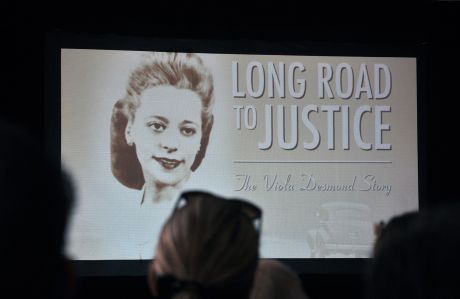Features
You are here
Remembering Viola Desmond

May 3, 2016
Some have referred to her as the Canadian Rosa Parks. But Rosa Parks could be called the American Viola Desmond. On Friday, November 8, 1946, nearly a decade before Rosa Parks sparked the Montgomery bus boycott, Viola Desmond became a symbol of resistance to racism in Nova Scotia.
While driving through New Glasgow, Nova Scotia, her car broke down and she decided to take in a movie at the Roseland Theatre while it was being repaired.
Desmond went into the theatre and asked to buy a downstairs ticket. The cashier, however, sold her a balcony ticket and gave her change. As she proceeded downstairs, the white ticket taker told her that she would have to go up to the balcony. Confused, Desmond returned to the cashier and asked to be given a downstairs ticket. The white cashier stated, “I’m sorry but I’m not permitted to sell downstairs tickets to you people.”
The cashier never used to the word “Black,” “Negro” or “colored, ” but Viola Desmond knew exactly what was meant by “you people” and proceeded back into the theatre to sit in the partially-filled downstairs section of the theatre.
Soon, the theatre manager confronted her in the theatre. She politely, but firmly, asked him to provide her a proper downstairs ticket as she would not be able to see very well from the balcony. The angry manager went off to find a police officer.
The state
As Viola Desmond wrote of the incident: “The policeman grasped my shoulders and the manger grabbed my legs, injuring my knee and hip. They carried me bodily from the theatre out into the street. The policeman put me in a waiting taxi and I was driven to the police station.” She spent the night in the jail.
The next morning she was brought before the magistrate. She had no lawyer, was not told of her right to seek bail or request an adjournment, and was not given the chance to cross-examine the three white witnesses at her trial. She was convicted of having violated the Theatres, Cinematographs and Amusements Act by not paying the price differential between the balcony and the lower seats. It was clear to all to see, however, that this was an incident where the state had again chosen to use provincial legislation to enforce racially discrimination in Nova scotia. She was fined $26 and had to pay it forthwith or risk spending a month in jail.
This was not the first time the Roseland Theatre was the centre of legal controversy. In 1942, Carrie Best brought a civil suit against the theatre for its racist seating policy. She lost the case and was forced to pay the theatre $156.07 in legal costs.
Influence and legacy
Viola Desmond believed that Black women should not have to be relegated to domestic work. She operated her own hair salon and inspired other Black women to follow an independent path. Accordingly, some saw her as an inspiration; others, a troublemaker.
Many noted activists took up her cause, including Pearleen Oliver, who convinced the Nova Scotia Association for the Advancement of Coloured People (NSAACP) to provide legal and moral support. Eventually, she challenged her conviction to the district court of Nova Scotia but justice there too was nonexistent.
Viola Desmond died alone in her apartment in 1965. The passage of time, however, had not dampened interest in the Roseland Theatre incident. Over the decades, activists in the Black community continued to insist that the injustice of her conviction had to be addressed.
Finally, in 2010, The Royal Prerogative of Mercy Free Pardon was declared in a ceremony at Province House. This was a free pardon – a signal that the original conviction was a miscarriage of justice. A stamp featuring Viola Desmond was unveiled in February 2012.
Black Lives Matter
As Graham Reynolds, author of Viola Desmond’s Canada: A History of Blacks and Racial Segregation in the Promised Land writes, “We have felt a sense of moral superiority with the Americans because of the extent of the problem in the United States. We look south and see violent racism and we are shocked. But if we have a close look at our own history, we have the same problems...In general, Canadians are not willing to accept the reality that we had racial segregation. It wasn’t enforced in the same way it was in the U.S. with Jim Crow laws. But in some ways it was worse. There was a practice of racial segregation quietly enforced by theatres, hotels, restaurants...In Canada, we don’t talk about these problems but they are quietly under the surface.”
For many struggling against racism in Nova Scotia, the Roseland Theatre incident was just one of many indignities suffered by Black Nova Scotians over the decades. With wounds like destruction of Africville still fresh in mind, Black Nova Scotians and their allies can take pride in the courage and audacity of a “troublemaker” like Viola Desmond. Seventy years after Viola Desmond’s fight against segregation, the fight against anti-Black racism continues, through movements like Black Lives Matter that are challenging carding and police violence.
Section:










